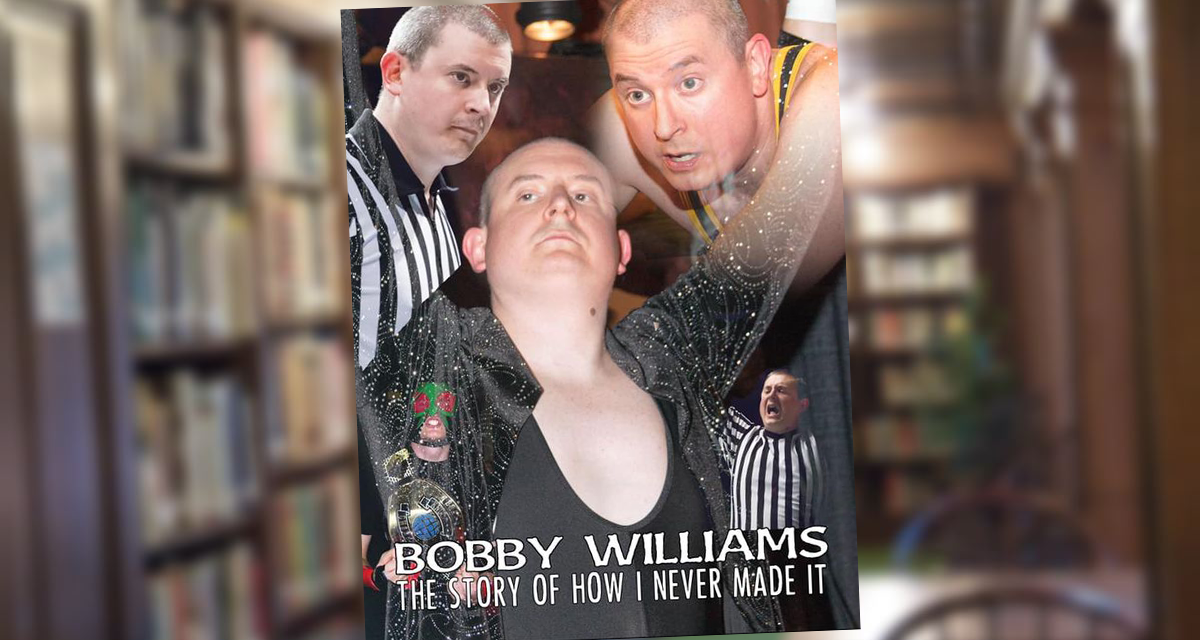They simply don’t make them like Robert “Bobby” Piskor anymore. Instead of resting on his laurels during a pandemic, Piskor, known in the western Pennsylvania professional wrestling circles as Bobby Williams, Robert Parker Williams or more familiarly as Potter, has looked back at his “first two decades” inside the squared circle in his autobiography Bobby Williams: The Story of How I Never Made It, out now and self-published. (Note: the author will be addressed in this review as Piskor for continuity.)
As many in the wrestling scene do, Piskor was exposed to the sport because his father, Ed, watched in the early ’90s. In fact, most of his family watched the action, and Piskor was hooked. Growing up just south east of downtown Pittsburgh in the suburb of Homestead, Piskor devoured as much of the television product as possible. He collected as many toys as possible, and on a shopping trip to the nearby Eastland Mall, his sister actually walked into a ring post that was being set up for a local wrestling match. That was the first indication for Piskor that wrestling was local, and not just on television. He would attend those shows regularly for years.
Once the internet became more prevalent, Piskor created a website and wrote about matches and angles, until one of the bigger promoters of the time threatened legal action. Piskor was only 13 years old at the time.
The greater Pittsburgh area is like a family, and everyone of note knows everyone else. Piskor was quickly learning about all of the promoters, wrestlers and “extended family.” He tells stories of meeting locals, as well as Extreme Championship Wrestling (ECW) regulars who wrestled often throughout the area.
In 2001 and still in his teens, Piskor and some friends started to help on ring crews just for the experience. He’d show up early and leave late. He’d also start a website for local wrestler and friend Devil Bhudakahn (James Fawcett). Instead of payment, Piskor asked for helping getting into the business. He was 15.
Soon, Piskor was training with local promoter “Gentleman” Joe Perri. On May 26, 2001, Piskor made his first appearance as a referee in Weirton, West Virginia. He would later become a wrestler and would do whatever he could to work in the world of professional wrestling.
It’s clear that Piskor—called “Potter” by friends and colleagues early on because he bore an uncanny resemblance to everyone’s favorite fictional wizard — has hustled throughout his entire career. The autobiography, encapsulated in an 80-page magazine through self-publisher Blurb.com, is his fourth work in about a year. His other works are more photo-driven, except for Devil Bhudakahn: The Man Behind the Mask, a tribute to dear friend Fawcett who tragically took his own life in 2007. Proceeds of the sales of that book go to the National Suicide Prevention Foundation.
Piskor’s autobiography is a fast-paced, straight-forward tale of trying to “make it” in the indy scene, with bigger hopes of catching eyes in Impact, Ring of Honor, or World Wrestling Entertainment (WWE). There are some hazing and drinking stories, and an unpleasant experience with Colt Cabana, but Piskor pulls punches when identifying some real seedy charlatans.
As a talented referee, Piskor was able to travel overseas, but primarily worked throughout western Pennsylvania, West Virginia and Ohio. A lot of it occurred before he was even 20! Name a federation in the Pittsburgh/Cleveland/Weirton market and Piskor has most likely refereed in at least one event.
Piskor details how he became the masked wrestler Mantis, and how he reinvented himself as a wrestler in some areas, but remained a referee in others. Fun fact: Piskor’s brother is famed “alternative” comic book artist Ed Piskor, who has drawn the Hip Hop Family Tree: 1983-1984 and X-Men: Grand Design. Some of Ed’s wrestling drawings have featured both Mantis and referee Potter in the same scene. Often their wrestling-loving father can be spotted in the art as well.
The book’s reflective is similar to the recently released book, Squared Circle, Full Circle, Joe Abel and Scott Steven’s look back at Abel’s career as a manager and wrestling personality, in that both works detail busy, regional careers. Both men wonder what might have happened if the right person took a chance on them. But ultimately, both are very satisfied with what they have accomplished in the zany world of wrestling.
Piskor has rubbed shoulders with a lot of established wrestlers in his 20 years, including Al Snow, Chris Hamrick, Bret Hart and Chris Jericho. Unfortunately for some readers, he only glazes over a promising story with Luna Vachon and the possibility of a hotel room invite. “If only I had that opportunity to seal that deal, I would have been considered a legend among my peers,” Piskor wrote.
Piskor details some backstage theatrics that will only resonate with those in the western Pennsylvania and Cleveland-area markets, but there are enough mainstream “names” dropped for a broader audience’s interest. He shares stories about how he was once one of Adam Rose’s Rosebuds in Pittsburgh and how he nearly got to work for Impact Wrestling.
Piskor also does a valiant effort to thank dozens of regional wrestlers and personalities, like Lord Zoltan (Ken Jugan), T-Rantula, former promoter Norm Connors, Perri, as well as his wife Natalie and daughter Lucy (he dedicates the book to her) for their support during the ride. Piskor says this isn’t the end because he intends to referee again once this pandemic is pinned to the mat.
RELATED LINKS
- Buy Bobby Williams: The Story of How I Never Made It on Piskor’s website
- May 31, 2020: Guest column: Book helping me deal with Devil Bhudakahn’s suicide
- SlamWrestling Master Book List

